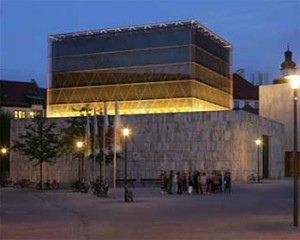No Chance of Becoming a Decisive Factor Again
 It was the birth or rather the invention of the German nation that became a major challenge for Jews in Germany. In the Holy Roman Empire, the notion of German- Jewish was a neutral legal one for both the gentile and the Jewish populations. Only when Deutschtum (Germanness) became a value per se during the era of nationalism in the first part of the 19th century was the concept “German-Jewish” upgraded. This is when the tension between “German” and “Jewish” became acute.
It was the birth or rather the invention of the German nation that became a major challenge for Jews in Germany. In the Holy Roman Empire, the notion of German- Jewish was a neutral legal one for both the gentile and the Jewish populations. Only when Deutschtum (Germanness) became a value per se during the era of nationalism in the first part of the 19th century was the concept “German-Jewish” upgraded. This is when the tension between “German” and “Jewish” became acute.
Up until then, the question was whether being Jewish and being German were compatible. This debate revolved around Jewishness as an ethnic, national framework, not so much as a religious community. Jews who were hoping for a German-Jewish symbiosis considered themselves first and foremost Germans. Some even described German-Jewish relations in terms of Jewish cultural dominance within German culture. For anti-semites the notion of “German-Jewish” was an abomination. For the racist system of the Third Reich there was no difference between German and other Jews: They all were Jews, arch-enemies of the German race.
And yet, after the Second World War Jews were allowed again to live in Germany. But the boycott on the word combination “German Jews” had not been lifted. The Jewish community emerging in 1950 insisted that its central organization be called “The Central Committee of Jews in Germany” (Zentralrat der Juden in Deutschland), not of German Jews (der deutschen Juden). This is still valid nowadays even though the Federal Republic placed an emphasis on Vergangenheitsbewältigung (coming to terms with one’s past) and also became economically successful. This, plus reunification in 1990, resulted in a dramatic change in how the adjective “German” is viewed.
And yet, only few Jews in Germany today consider themselves German Jews. Those who do are mainly intellectuals who grew up in post-war Germany. This group is very small and will be more or less lost. On the other hand, the majority of Jews in Germany today are immigrants from Eastern Europe: Jewish but not German.
The prognosis is clear but frustrating: There will be no re-birth of German Jews. Jews in Germany have no chance of becoming a decisive factor again in the development of the Jewish religion or history. They cannot compete either with the largest Jewish diaspora, in the United States, or with Israel.
Indeed, Israeli Jews practically ignore the existence of German Jewry. A public opinion poll in 2006 showed that nearly half of Israeli Jews were unaware of an organized community of Jews in Germany and only 31% relate to this diaspora as a “normal” diaspora. Some 8% still believe that Jews are not allowed to live in Germany. From the Israeli point of view, Jews in Germany just do not count. This is in spite of the fact that the Jewish leadership in Germany supports Israel’s policies faithfully and both the German political class and the general public consider the Jewish community in Germany to be like other diaspora communities.
Perhaps a bigger contributor to the decline of the notion of “deutsch-jüdisch” is not only that the number of Jews in Germany – compared to the U.S., Israel or even to France – is negligible, but also that the frame of reference is now Europe. Nationalism as experienced in the 19th and 20th centuries in Europe has not only changed, it might be extinct. This is even acknowledged by Israelis, who have lived through an age of nationalism, albeit in the context of the middle east. Since Israel is itself a member of the European Soccer Association (UEFA), its European horizons have been broadened. For Israeli Jews it does not matter whether an Israeli soccer player joins a Polish, English or Spanish club – or even gets signed by the German Bundesliga.
